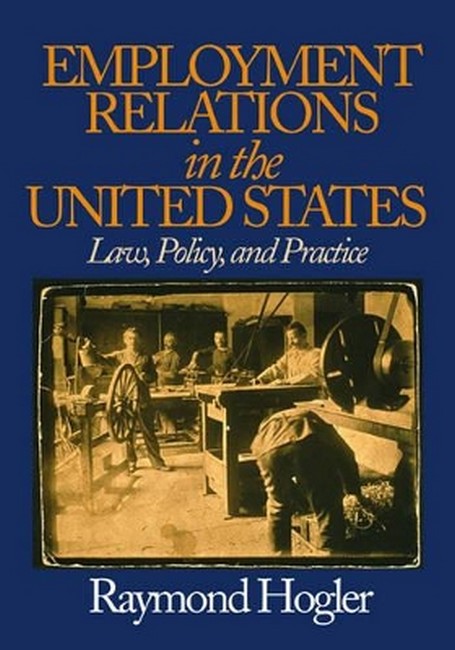Raymond L. Hogler teaches labor relations and human resource management at Colorado State University. He earned Ph.D. and J.D. degrees from the University of Colorado. He attended Emory University as a Woodrow Wilson Fellow and the University of Wales (Swansea) as a Fulbright Scholar. Prior to his employment at CSU, Dr. Hogler taught in the Department of Labor Studies and Industrial Relations at Pennsylvania State University, and in 1994, he was a Visiting Scholar at the University of Warwick. He is certified as a labor arbitrator by the Federal Mediation and Conciliation Service. Over the past two decades, he has published a number of books and articles on employment issues, including a study of employee participation programs and labor law in the United States. In 2007, he held the Fulbright Distinguished Chair in Labor Law at the Uiversity of Tuscia in Viterbo, Italy.
Request Academic Copy
Please copy the ISBN for submitting review copy form
Description
Preface 1. Contemporary Employment Relations in Historical Perspective The Start of a New Millenium Analyzing "Exceptionalism": Is the United States Different and Why? Studying Work The Nature of Labor Contracts An Overview of This Book Firms and Managers Organized Labor Community Institutions PART I. THE ERA OF MANAGEMENT, 1880 - 1935 2. Industrial Expansion and the Foundations of Unionisms The Rise of Corporations Beginnings of Collective Organization Union Growth and Labor Conflict From Conflict to Cooperation 3. Managerial Control and the Beginnings of State Regulation Judges and the Law of Employment Contracts Injunctions and Antitrust Scientific Management and the Efficiency Movement Welfare Capitalism and the Emergence of the Modern Personnel System Workers' Compensation Insurance - An Early Exception to Exceptionalism Summing up the 1920s PART II: THE EVOLUTION OF COLLECTIVE BARGAINING 4. The Creation of Federal Labor Policy: World War I Through the New Deal Wartime Policies and the Effect on Collective Bargaining Labor Legislation Before the Wagner Act The National Labor Relations (Wagner) Act of 1935 Social Legislation: Retirement, Unemployment, and Labor Standards The Federal Mandates and the Collective Bargaining Process 5. Rise and Decline of the Labor Movement, 1935 - 2000 Founding of the CIO The Supreme Court and the Wagner Act Labor Relations During World War II The Labor Management Relations (Taft-Hartley) Act, 1947 Cosolidation of Collective Bargaining and Employment Policies Union Decline: 1970s to the Millenium PART III: INDIVIDUAL EMPLOYMENT RIGHTS, 1960s - 2000s 6. Protecting Individuals From Discrimination Equal Pay Act Civil Rights Acts Age Discrimination in Employment Act Americans With Disabilities Act of 1990 7. Workplace Rights and Benefits Workplace Health and Safety: OSHA Employee Retirement and Income Security Act Health Insurance and Employment The Family and Medical Leave Act of 1993 Exceptions to the Employment At Will Rule PART IV: REBUILDING THE EMPLOYMENT CONTRACT: PRACTICES, POLICIES, AND POLITICS 8. Contemporary Employment Issues Organizational Justice as an Alternative to Litigation Bringing Unions Back In Economic Security for U. S. Workers: Health Insurance, Pensions, and Employment Stability 9. Conclusions Back to the Future? The Job Machine in the 2000s A Final Thought Index About the Author
"An impressive work of meticulous scholarship...provides students with an historical background and context leading to an understanding of how the American system of the organized labor movement developed and just how it differs from system in other industrialized nations. Of special interest is Hogler's unique historical and evolutionary oriented explanation of the developmental history and nature of employment relations. Highly recommended reading -- especially for students of American employment relations and labor history." -- Wisconsin Bookwatch "Mr. Hogler, a professor of labor relations and human resource management at Colorado State University, presents a superbly written, lucidly argued work. It deserves a wide audience of students as well as experts with a deep interest in today's 'labor question.'" -- MONTHLY LABOR REVIEW "Employment Relations analyzes the limits of these existing laws in the new political economy and suggests that in order to rebuild sustainable and just employment environments, a revival of worker collective action is crucial. Hogler's underlying political goal is to frame employment and labor laws in a way that illuminates their inherent connection to wealth distribution, status, and security." -- Michigan Law Review

